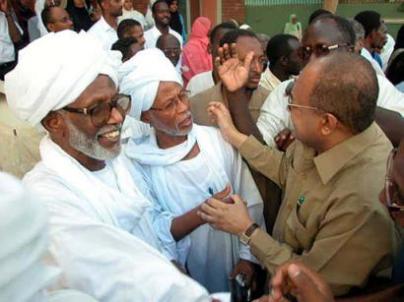Sudan’s Turabi to keep backing beliefs that caused arrest

KHARTOUM, Sudan, Oct. 13, 2003 (AP) — Upon his release after more than two years of house arrest, hard-line Islamic leader and opposition figure Hassan Turabi pledged Monday to stick to the principles that led to his incarceration.
“I will continue working for the same principles for which I was arrested: democracy, freedom of expression and human rights,” the smiling, healthy-looking Turabi – dressed in a white robe and turban – told reporters at his home.
Sudanese authorities pardoned Turabi Monday. He had been arrested following calls to expand political reforms in Africa’s largest country. His release comes amid international and local pressure to introduce political reforms and expand human rights in Sudan , where the government has been criticized for cracking down on opposition groups and closing reformist newspapers.
Hundreds of supporters greeted Turabi outside his home in the capital, hugging him and shouting, “Allahu akbar,” or “God is great.” Sheep were slaughtered to welcome the leader on his return.
Turabi was once a top ally of Sudanese President Omar el-Bashir and the main architect of the Islamic fundamentalist government that was set up in the 1990s. But in 1999, the two had a falling out; el-Bashir accused Turabi, the speaker of parliament, of trying to grab power and stripped him of his position.
The release of Turabi and seven other political detainees comes amid a reform drive by el-Bashir, seen as an effort to bring some northern opposition groups into a united front to strengthen his government in peace talks with southern rebels aimed at ending Sudan’s 20-year civil war.
Fathi Khalil, the Sudanese Bar Association president and a member of the Sudanese Council for Human Rights, said Turabi’s pardoning will boost efforts to create a new Sudan built on “real justice and constitutional rights.”
“This is a significant step that should be commended and comes at the appropriate time, as Sudan needs to bring together all its political forces so they will rally behind efforts to realize peace in the country,” Khalil told The Associated Press.
Abdel-Salam Gizouli, Turabi’s lawyer, told the AP that el-Bashir pardoned Turabi, leader of the Popular National Congress Party, and seven other political detainees.
Sudanese security authorities issued a statement saying Turabi’s release “has come at a time when the … circumstances that had led to his arrest are no longer valid.”
The director-general of Sudan’s security authority, Lt. Gen. Salah Abdullah, said in the statement the detention of Turabi and his supporters wasn’t meant “to politically assassinate him” or remove him from the political scene, but “to serve God, the security, peace and stability of the homeland.”
Abdullah added that all restrictions against Turabi’s political party have been lifted, “enabling it to practice all political, social and journalistic activities.”
The Sudanese government has taken steps toward political reform in recent months, releasing 32 other political prisoners in August, ending newspaper censorship and lifting a travel ban on some opposition politicians.
